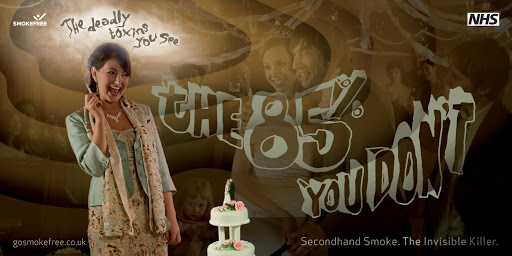[THREAD] I’ve been thinking a lot about this recently. The new COVID-19 measures are the biggest restrictions on behaviour in public spaces since the smoking ban. I was working at Dept of Health on smoking when the ban came in, and there’s some parallels that might play out... https://twitter.com/warrenhatter/status/1276577499967881216
Public perception of the smoking ban was that it was to discourage smoking generally. But as with the new COVID-19 measures, they were about protecting others - not changing individual behaviour. Specifically protecting the health of people working in pubs, restaurants etc.
It’s a health and safety regulation. Being in a smoke-filled room, whether you smoke or not, is exposing you to toxic chemicals. Just as it would it if it had asbestos tiles. And requiring people to work in that environment is dangerous, and immoral...
So government justification for the measures relates to the risks of secondhand smoke. Similarly, for COVID-19, working in an environment where people do not take preventative measures is dangerous. What you do at home or outside is your business - but when you enter a shop...
...restaurant or pub without a mask you are potentially exposing the people who work there to an unnecessary hazard. It’s got nothing to do with your liberties or encouraging you to wear a mask. It’s a health and safety measure. And should be communicated/positioned as such...
...we found with smoking it was impossible to post-rationalise exposing others to secondhand smoke, as it’s fundamentally selfish behaviour. Likewise here. As Schwartz says in the article...
[The issue with] “the public health messages being offered as society opens up is that they have been too much focused on the effects of our behavior on us, and not enough focused on the effects of our behavior on others.” Public acceptance for the smoking ban was changed by...
...several years of campaigning about the risks of secondhand smoke (I even appeared as an extra in one of the ads)! And once the measures were in place people quickly adapted, and discovered smoke free bars and restaurants were much more pleasant. We’d never go back...
...because perceptions have now aligned with behaviour (plus we realised just how much smoking disguised how smelly and revolting some places are). In this case the measures make places LESS inviting/pleasant, so behaviour may change accordingly, and attitudes too...
...but time will tell. Either way, adherence to the smoking ban was near universal because the norms were set before the regulations were put into force. Given the high mental availability of risks of COVID-19, it’s possible there will be general compliance. But the worry is...
...norms around wearing a mask to protect others have not been set. People still see it as personally protective - not socially protective. [ENDS]
One final thing (prompted by @warrenhatter) here's the ad I was in (in the background on the right). I was a bit more visible on the giant roadside posters, needless to say!

 Read on Twitter
Read on Twitter


